After the two days of bad weather on 8 and 9 February that devastated numerous farms in Sicily, a difficult damage assessment has begun. Water is slowly beginning to drain away from fields and greenhouses, but unfortunately, in some areas, it will still take days before being physically able to move into the land.
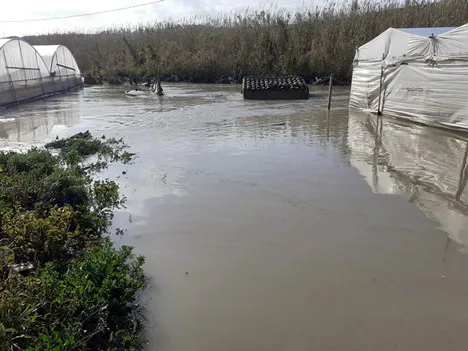 In some locations, it will take days for the water to drain away
In some locations, it will take days for the water to drain away
How can we define what happened other than as a predicted disaster and, above all, how is the market reacting in regard to an inevitable collapse in production?
Sicily is suffering helplessly from climate change, in the throes of neglect and deprived maintenance of watercourses.
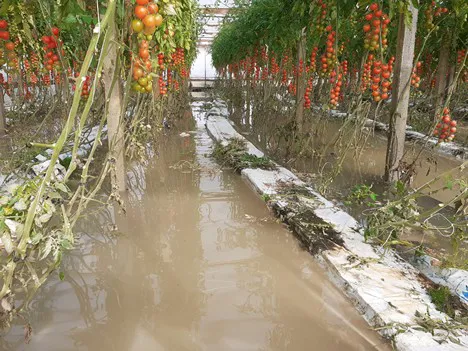
The contraction of supply is causing prices to rise rapidly
"It's a more than normal reaction," says one sales operator. 'The disaster caused by the bad weather is enormous, and we have to reckon with less supply of goods both at the fruit and vegetable market and at the packing and packaging warehouses in south-eastern Sicily. Practically the entire local production area has been affected by spotty losses. The area of Dirillo, finally, is entirely flooded as a consequence of the opening of the Ragoleto dam. In the coming days, when the exact availability of product in the countryside compared to the time before the cyclone will be assessed, we will also ascertain how quotations will move."
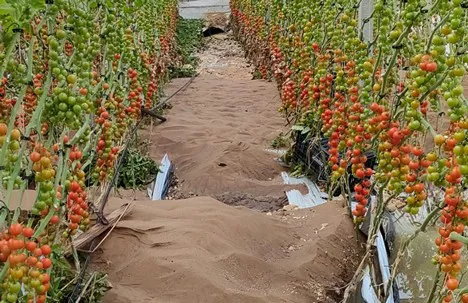 This is what remains after a flood (albeit modest, in this case) in a tomato greenhouse
This is what remains after a flood (albeit modest, in this case) in a tomato greenhouse
Meanwhile, on Monday morning, the cherry tomato quoted between €3.20 - €3.50/kg; datterino tomato €3.40 - €3.60/kg; dark green courgette €2.20 - €2.40/kg; eggplant €2.90 - €3.10/kg; red pepper €3.20 - €3.40; yellow pepper €3.50 - €3.80. But it only took a day for prices to fall back to, almost, pre-cyclone levels.
Institutions have taken the lead, and on Sunday, not only did Italy's Governor Schifani personally visit the city, but a meeting was also held in Vittoria, the most important hub in the Sicilian fruit and vegetable sector, during which the regional councilor for agriculture, Luca Sammartino, spoke and expressed his hope for a rapid recovery.
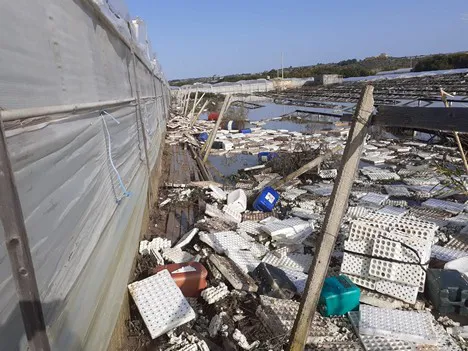 There will also be an enormous amount of environmental damage to deal with
There will also be an enormous amount of environmental damage to deal with
The councilor requested an immediate assessment of the damage, followed by the implementation of the solidarity fund, which is under the responsibility of the national government. Prevention remains the key concern, in order to avoid the continual recurrence of such disasters. "We have activated the agricultural inspectorates to follow up on the preparation of the damage survey forms so that the data on the damage can be passed on to the government easily," said Sammartino.
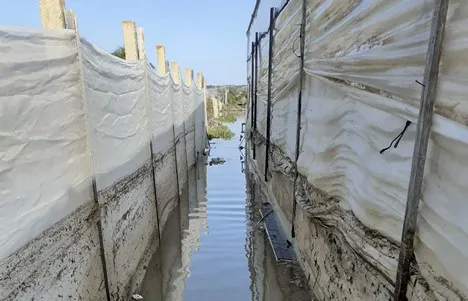
The meeting was also attended by the General Manager of the Department of Agriculture, Dario Cartabellotta, who provided some technical and bureaucratic information and pointed out that the declaration of a natural disaster should not be confused with the assessment of the damage, otherwise it is not possible to obtain reparations. There have been cases in the past where funds were available but could not be released because the necessary documentation was missing.
 Sammartino, Aiello, Cartabellotta
Sammartino, Aiello, Cartabellotta
At the meeting, the mayors of the district also took part, including the mayor of Vittoria, Francesco Aiello, who hosted the speakers in the City Hall.
